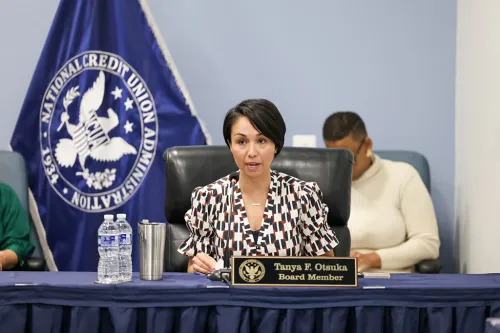NCUA Board Member Tanya F. Otsuka during a meeting of the NCUA Board.
As Prepared for Delivery on November 22, 2024
Thank you, OFCO, for the presentation. The budget of an agency, organization, or even a household is a testament to its priorities. And it is no different here. Our budget reflects the goals we seek to accomplish as an agency and where we are investing resources to ultimately protect our system of cooperative credit.
While this budget is not the final product, this is a good start. The 2025 budget reflects a 12 percent increase from the 2024 budget and the 2026 requested budget reflects a 7.5% increase. However, we should note that the proposed 2025 budget is similar in size to the 2025 budget that was already approved last year. Actually, this iteration is $0.3 million less than the one the previous Board approved last year.
In addition to the total number remaining fairly consistent, the 2025 proposed budget still allows for innovation and growth at the NCUA. It includes an increase of 14 positions compared to 2024. Only 10 of which are actual new positions. This increase in staffing represents an increase of just one percent in total headcount.
The additional headcount and capital investments are crucial to the success of policy priorities I support. Mainly, supporting small and MDI credit unions, expanding our consumer financial protection program, and maintaining a robust examination and supervisory process, especially for large credit unions.
As I have said, MDIs and small credit unions play a unique role in providing credit and financial access to lower-income individuals, immigrants, justice-impacted individuals, rural communities, and other communities left behind by large banks.
In February, I strongly supported the passage of our updated policy statement for our MDI preservation program. This budget allocates resources to implement its goals. The additional resources will allow the NCUA to 1) build greater awareness of the unique needs of small credit unions and MDIs and their role serving underserved communities; 2) expand opportunities for these credit unions to receive support through NCUA grants and training; and 3) promote partnerships with organizations and industry mentors that can support small credit unions and MDIs.
Secondly, the NCUA continues to strengthen its consumer financial protection program. However, we have more work to do to implement a robust program that adequately examines credit unions for violations of the Truth in Lending Act or Regulation E (Electronic Fund Transfer) violations. Consumer protection laws are intended to ensure members understand the financial products and services offered to them and that they are offered on fair terms. They both depend on strong management.
The NCUA cannot do its job as a safety-and-soundness regulator if we overlook consumer compliance. Consumer compliance failures can often indicate problems with internal controls, operational risk, or lead to broader financial risks. And unfair banking practices are not sound banking practices. If fees for products and services exceed operational expenses or the cost to the member is disproportionate to the benefit, it not only raises safety and soundness and consumer protection concerns, but it also goes beyond the member-first mission. Furthermore, the NCUA has an obligation to ensure that insured credit unions are in compliance with the laws that Congress has enacted.
Therefore, I am pleased to see additional investments in the Office of Consumer Financial Protection. Our examiners in the Division of Fair Lending Supervision have identified instances of discrimination based on age and marital status, race-based redlining, violations of the Home Mortgage Disclosure Act, and inadequate fair lending compliance management systems. The additional director in our Fair Lending Division will allow us to build out our HMDA validation program and ultimately complete more fair lending examinations. Strengthening our consumer protection program helps make sure members are protected, but also is a resource for credit unions to address issues proactively and make sure they comply with the law.
The last investment I would like to highlight is the additional capacity in our ONES division. Credit unions and leagues have repeatedly expressed a need for increased support for credit unions approaching the $10 billion mark and the ONES category. The examination program for large credit unions is reasonably more complex and credit unions need to be prepared logistically and operationally to meet the new standards. This budget proposal increases ONES by three positions in 2025: a supervisor for the capital planning and stress testing division, a financial data analyst, and a new executive position to lead the financial risk management team. And three positions are recommended for 2026: one national credit union examiner, one national lending specialist, and one national payment systems officer.
In my opinion, this budget is responsive to credit union needs and reflects the NCUA’s commitment to address emerging risks, while also finding places to save costs. The proposed budget for 2025 includes a significant reduction in rent, communication, and utilities, and administrative expenses. With a decrease of approximately four percent and 32 percent, respectively. And the 2025 proposed budget is lower than the 2025 budget that was approved last year.
The NCUA’s job as a strong, effective, and independent regulator is critical to protecting the millions of members who rely on us to safeguard their hard-earned money. We can only do so if we make the necessary investments in our infrastructure and staff. That means ensuring we have sufficient staff and expertise to withstand turnover, provide continuity of operations, and address emerging risks to our system of cooperative credit.
Ultimately the Board must ensure the agency’s staff is well supported to execute the NCUA’s mission. To that end, I look forward to working with my fellow Board members and external stakeholders to ensure we pass a budget that sets up the NCUA and the credit union system for success.




